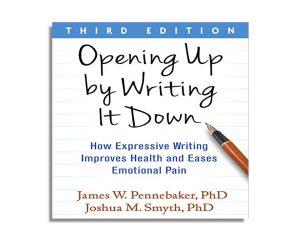Regardless of your profession, you need to write. But I’m not going to tell you that. Instead let me share with you briefly why I need to write.
Write to Clear Out the Junk
When you write you give yourself a chance to purge the junk in a healthy way. James Pennebaker, a social psychologist at UT-Austin, studied the impact of writing on mental health over 35 years ago. More than 200 research studies have shown that “emotional writing” can improve people’s physical and emotional health. Go ahead, write about your worst experiences and feelings or even today’s junk.
A Relapsed Addict Gets Back with the Program
I have kept journals since the time Pennebaker published his findings, but not consistently. I’m a recovering perfectionist. My writing was never good enough, and neither were my work habits. I got value from writing, but I didn’t lean into it often.
It took me years to start opening up about my emotions, to start admitting my perfectionism was killing my creativity. I had a huge project at work that I tried to do by myself because I didn’t think anyone else could handle the details and do it right. But once I handed off the management to someone else, it launched me into the biggest earning years of my career.
Last year in December (2021) I heard about Pennebaker for the first time and it made so much sense. I even made a video for Youtube about mindfulness journaling to keep me honest. And I also made a decision: In January I’m going to write two pages in my journal every day and also start writing a mini-essay for 30 days.
Writing is Like a Daily Workout Now
When I gave up being right or doing it perfect and committed to being consistent, something shifted. Just this morning I went from a low energy, post-poor-sleep slump to a high energy, “bring it on, February!” after writing my two pages. Things got sorted. It’s been three weeks since I started, and the habit feels good. Slow writing, done every day may just be the thing that gives me sanity this year.





